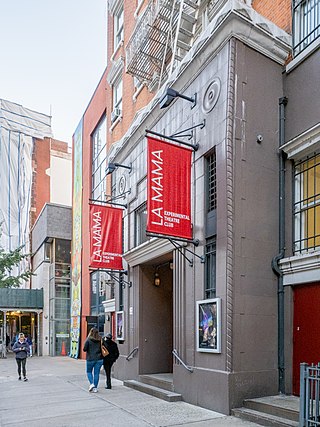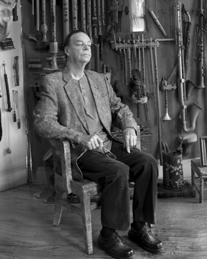
Hair: The American Tribal Love-Rock Musical is a rock musical with a book and lyrics by Gerome Ragni and James Rado and music by Galt MacDermot. The work reflects the creators' observations of the hippie counterculture and sexual revolution of the late 1960s, and several of its songs became anthems of the anti-Vietnam War peace movement. The musical's profanity, its depiction of the use of illegal drugs, its treatment of sexuality, its irreverence for the American flag, and its nude scene caused much comment and controversy. The work broke new ground in musical theatre by defining the genre of "rock musical", using a racially integrated cast, and inviting the audience onstage for a "Be-In" finale.
James Alexander Radomski, known professionally as James Rado, was an American actor, playwright, director, and composer, best known as the co-author, along with Gerome Ragni, of the 1967 musical Hair. He and Ragni won for Best Musical Theater Album at the 11th Annual Grammy Awards and were nominated for the 1969 Tony Award for Best Musical.
Gerome Ragni was an American actor, singer, and songwriter, best known as one of the stars and co-writers of the 1967 musical Hair: The American Tribal Love-Rock Musical. On June 18, 2009, he was inducted into the Songwriters Hall of Fame.

Off-off-Broadway theaters are smaller New York City theaters than Broadway and off-Broadway theaters, and usually have fewer than 100 seats. The off-off-Broadway movement began in 1958 as part of a response to perceived commercialism of the professional theatre scene and as an experimental or avant-garde movement of drama and theatre. Over time, some off-off-Broadway productions have moved away from the movement's early experimental spirit.
The Open Theater was an experimental theatre group in New York City, active from 1963 to 1973.

Tom Eyen was an American playwright, lyricist, television writer and director. He received a Tony Award for Best Book of a Musical for Dreamgirls in 1981.

La MaMa Experimental Theatre Club is an Off-Off-Broadway theater founded in 1961 by African-American theatre director, producer, and fashion designer Ellen Stewart. Located in the East Village neighborhood of Manhattan in New York City, the theater began in the basement boutique where Stewart sold her fashion designs. Stewart turned the space into a theater at night, focusing on the work of young playwrights.

Dude (The Highway Life) is a rock musical with a book and lyrics by Gerome Ragni and music by Galt MacDermot. It is an allegory about good and evil, the conflict between mankind's creative and destructive urges, the power of love, and the joy to be found in simple pleasures. Dude is an everyman who loses his innocence and fights to regain it.

Tom O'Horgan was an American theatre and film director, composer, actor and musician. He is best known for his Broadway work as director of the hit musicals Hair and Jesus Christ Superstar. During his career he sought to achieve a form of "total theater" described by The New York Times as "wittily physical", and which earned him a reputation as the "Busby Berkeley of the acid set".
Marguerite Duffy, known professionally as Megan Terry, was an American playwright, screenwriter, and theatre artist.
"Three-Five-Zero-Zero" is an anti-war song, from the 1967 musical Hair, consisting of a montage of words and phrases similar to those of the 1966 Allen Ginsberg poem "Wichita Vortex Sutra". In the song, the phrases are combined to create images of the violence of military combat and suffering of the Vietnam War. In its first line, for instance, "Ripped open by metal explosion" is followed by "Caught in barbed wire/Fireball/Bullet shock".
Corner Theatre E.T.C. was an experimental theater located in Baltimore, Maryland, existing from 1968 to 1987 as a nonprofit cultural organization.

Haralambos Monroe "Harry" Koutoukas was a surrealist playwright, actor and teacher. Along with Sam Shepard, Lanford Wilson, Doric Wilson, Tom Eyen and Robert Patrick, Koutoukas was among the artists who gave birth to the Off-Off Broadway theatre movement of the 1960s and 1970s.
Theatre Genesis was an off-off-Broadway theater founded in 1964 by Ralph Cook. Located in the historic St. Mark's Church in-the-Bowery in the East Village of Manhattan, it produced the work of new American playwrights, including Lanford Wilson, Tony Barsha, Murray Mednick, Leonard Melfi, Walter Hadler, and Sam Shepard. Theatre Genesis is often credited as one of the original off-off-Broadway theaters, along with Joe Cino's Caffe Cino, Ellen Stewart's La MaMa Experimental Theatre Club, and Judson Poets Theatre.

Hair is the cast recording of the original, Off-Broadway cast of the musical Hair: An American Tribal Love-Rock Musical. It was released in 1967 by RCA Victor. Hair premiered Off-Broadway at the Public Theater on October 17, 1967, and the cast album was recorded two weeks later. The lead roles were played by Walker Daniels as Claude, Gerome Ragni as Berger, Jill O'Hara as Sheila, Steve Dean as Woof, Arnold Wilkerson as Hud, Sally Eaton as Jeanie and Shelley Plimpton as Crissy.
Jean-Claude van Itallie was a Belgian-born American playwright, performer, and theatre workshop teacher. He is best known for his 1966 anti-Vietnam War play America Hurrah;The Serpent, an ensemble play he wrote with Joseph Chaikin's Open Theatre; his theatrical adaptation of the Tibetan Book of the Dead; and his translations of Anton Chekhov's plays.
Marianne de Pury is a Swiss theatre artist and composer born in St. Gallen, Switzerland. She is best known as the musical composer of two 1966 anti-war plays, Jean-Claude van Itallie's social satire America Hurrah and Megan Terry's rock musical Viet Rock.
The Harris Family is an American family of entertainers. Their careers, collectively and individually, encompass theater, music, film, broadcast media and performance art. They are best known as pioneers of experimental Off-Off-Broadway theater in New York City, San Francisco and Europe from the mid-1960s through the early 1980s.

The Firehouse Theater of Minneapolis and later of San Francisco was a significant producer of experimental, theater of the absurd, and avant guard theater in the 1960s and 1970s. Its productions included new plays and world premieres, often presented with radical or inventive directorial styles. The Firehouse introduced playwrights and new plays to Minneapolis and San Francisco. It premiered plays by Megan Terry, Sam Shepard, Jean-Claude van Itallie, María Irene Fornés and others; and it presented plays by Harold Pinter, John Arden, August Strindberg, John Osborne, Arthur Kopit, Eugène Ionesco, Berthold Brecht, Samuel Beckett and others. In a 1987 interview Martha Boesing, the artistic director of another Minneapolis theatre, described the Firehouse Theater as "the most extreme of all the groups creating experimental theater in the sixties, and the closest to Artaud’s vision." Writing in 1968, The New York Times said that the Firehouse Theater "has been doing avantgarde plays in Minneapolis nearly as long as the Tyrone Guthrie Theater has been doing the other kind, and with much less help from the Establishment." That same year, when a federal grant was provided to support the Firehouse, it was pointed out in the Congressional Record that the Firehouse Theatre "is the only major theatre dealing experimentally with the writing of plays and their production outside the metropolitan New York area."








